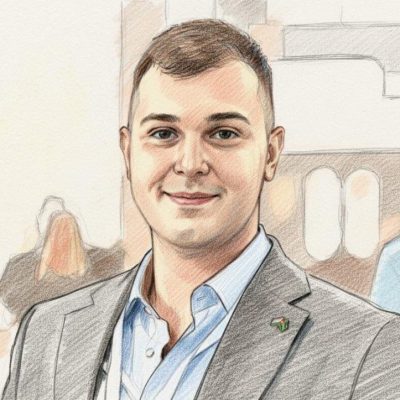
France's historical geopolitical rivalry with Britain is an underestimated driver of its actions in the South Caucasus. Today, it faces a dilemma: choosing between its strong Armenian diaspora or Azerbaijan, a potential ally of the region's growing economic power.
By Farid Shukurlu
On the last day of January, the Center of Analysis of International Relations (AIR Center) treated a distinguished mix of guests in Baku to a conference on France’s role in the Armenia-Azerbaijan conflict. The conference created a unique environment for French and Azerbaijani scholars, ambassadors, and journalists to dive into the geopolitical complexities of France’s recent role in the region.
From the historical evolution of relations to Armenia's ongoing French favouritism, the conference focused on finding common ground for better relations between Azerbaijan and France, which had been damaged mainly by President Emmanuel Macron’s anti-Azerbaijan rhetoric and views. “France has worsened the relations between Paris and Baku while Azerbaijan has always sought to establish pragmatic relations with France based on mutual trust”, said AIR chairman Farid Shafiyev.
Historically, France has been perceived as an essential strategic partner for Azerbaijan since the founders of the First Democratic Republic of Azerbaijan were mainly educated in France and influenced by the French school of liberalism, which led to the establishment of the first secular and democratic republic in the East.
French scholar Gil Michaeli insists that France has consistently mistreated Azerbaijan despite Baku’s goodwill efforts, such as establishing a French school and university and being one of the first countries to recognise Azerbaijan’s independence. Heydar Aliyev’s first state visit was to France, despite Azerbaijan facing economic hardships, unemployment, and war-induced displacement, as he sought to distance Baku from Russia.
French energy giant Total was key in brokering the "Contract of the Century" in Azerbaijan’s oil sector. Meanwhile, the Armenian diaspora, increasingly active after 1994’s peace treaty, lobbied for Artsakh’s recognition, strengthening ties with Western elites. Michaeli concludes that French politicians risk more than they gain by opposing Armenia.
The balanced diplomatic relations were followed by former French presidents Nicolas Sarkozy and François Hollande’s official visits to Azerbaijan until President Macron’s administration altered this dynamic. The latter’s favouritism, fuelled by the backing of the Armenian diaspora, proved provocative when President Macron bid on a visit to Iravan but refused to come to Baku to initiate bilateral talks. Shafiyev described this negative shift by reassuring the role of more than 600.000 Armenians in the diaspora whose influence on the French political class is undeniable.
On the one hand, their paramount aim was to lobby the French Parliament to recognise the Armenian genocide due to their historical anti-Turkic sentiment. On the other hand, the Armenian Diaspora never made a statement regarding more than a million IDPs who were ethnically cleansed from Karabakh while forcing 250.000 Azerbaijanis out of modern-day Armenia. This mechanism became even more popular when the diaspora pushed France to recognise the so-called independent Republic of Artsakh, which did not happen at a state level.
Prof. Christian Vallar of France argues that Armenian figures like Charles Aznavour and Kim Kardashian have influenced France’s political elite, shaping policies such as Jacques Chirac’s 2001 recognition of the Armenian Genocide. This alignment impacted France’s role in the Minsk Group, which, despite hosting peace talks, failed to resolve the Armenia-Azerbaijan conflict.
Despite cultural ties, relations shifted in 2018 when Macron visited Yerevan but not Baku. However, with Total’s investments in Azerbaijan’s oil sector, economic relations remain strong. Meanwhile, far-left politicians and Armenian MPs have pushed to recognise the separatist Artsakh regime, straining ties. Azerbaijan also criticises France’s double standards, neglecting the displacement of one million Azerbaijanis while advocating for Armenia. Disputes over Azerbaijan’s support for island nations’ liberation have added to tensions, yet both countries stand to gain from improved cooperation.
However, Azerbaijan is still optimistic about bettering the relations if the French Government ceases to use their Azerbaijano-phobic sentiment in foreign policy. This is the leading cause of why educational conferences are held. “Azerbaijan respects and admires the French culture, language and people; it is the French Government whose attitude towards our country is inconsiderate”, quoted Azerbaijani Tural Ganjaliyev, who also emphasised the principles the French Republic was built upon.
The Minsk Group’s role in settling the conflict was also questioned during the panel discussion. Dr Robert Cutler’s analysis concluded that following the First Nagorno-Karabakh War (1988-1994), the French interest as a co-chair was consistently undermined since they always prioritised their pro-Armenian position against Azerbaijan.
Prof. Mammadaga Bakhishov pointed out that while France pressured Turkiye to aid Armenia, it did not support Azerbaijani IDPs. He also highlighted instances where France sheltered individuals accused of terrorism while claiming to oppose such activities globally. Even today, the activities of anti-Semitic and Turkophobic ASALA are observed and neglected in France.
From the Orly Airport attack to the desecration of the Iravan Synagogue, the Armenian terrorist group has claimed the lives of dozens of civilians. It is still speculated they negotiated a secret agreement with the French Government in 1982. Thus, they are still sheltered in France.
The Fifth Republic, a nickname for the current French political regime, also failed in its humane duty to recognise the “Khojali Genocide”, where the Armenian regime massacred 613 innocent Azerbaijanis, wounded hundreds and arrested over a thousand. The international community called for accountability, but the French delegation remained silent.
The conference concluded by summoning all parties to dialogue to rebuild relations and provide reconciliation between Baku and Paris. Ambassador Shafiyev accentuated, “Azerbaijan is not an initiator of tense relationships with France”, and urged the French Government to pursue a neutral approach in the Armenia-Azerbaijan conflict.
All relations should be based on mutual respect, overcoming entrenched biases for a more peaceful future in the South Caucasus. Azerbaijan has never disregarded any country and built a reliable partnership with the West, unlike Armenia, a close ally of two of the West’s biggest enemies, Russia and Iran.





